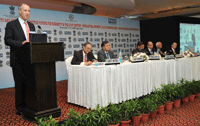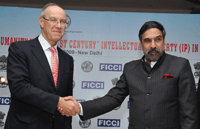International Forum Opens with Emphasis on Need for Balance in IP Systems
Geneva,
November 11, 2009
PR/2009/614

Credit: Dhillon Photographics
The need for a balance in the intellectual property (IP) system between effective incentives for innovation and the diffusion of the benefits of innovation, as well as the interface between IP and public policy objectives, such as the environment and public health was emphasized by India’s Minister for Commerce and Industry Anand Sharma at the opening of the 5th International Forum on Creativity and Inventions - A Better Future for Humanity in the 21st Century, on November 11, 2009 in New Delhi. WIPO Director General Francis Gurry also underlined the need for balance and outlined the challenges and opportunities facing the IP community in a rapidly evolving economic and technological environment.
Mr. Sharma said intellectual property is in the spotlight, receiving more focus and attention than ever before. He noted that technological innovation is driving economic development and underlined the Indian Government’s commitment to ensuring a robust IP environment – both in terms of a legal and administrative framework. “Those who are behind new innovations need assurances from multilateral organizations and also from the governments – we in India remain mindful of that and we have really strong IP regimes,” Mr. Sharma said.
The Minister said that while IP needs a secure environment, it is equally important to ensure that the benefits of innovation and knowledge are shared. In this respect, he underlined the need to ensure universal health and education, to alleviate poverty and to reduce the knowledge divide. Mr. Sharma underlined the need to improve the capacity of developing and least developed countries (LDCs) to benefit from the knowledge economy and the imperative of improving access to the benefits offered by the IP systems.

DG Gurry greets Minister Sharma at Forum opening (Credit: Dhillon Photographics)
Mr. Sharma said the Indian generics sector has succeeded in driving down the global price of life-saving medications. On climate change, the Minister said there has to be free transfer of relevant technology to poor countries, as well as the availability of resources. “That is where the balance has to come…it is not easy to create the balance, but there is no way forward if that balance is not there. We should be addressing these larger issues too.”
Mr. Gurry underlined the critical role of IP in developing solutions to key policy questions, including public health, climate change, and food security. He said countries must work together to ensure that the IP system serves as a stimulus for developing solutions to the global challenges confronting policy makers across the world.
The Director General said the recent economic crisis has had a visible impact on demand for IP rights. Despite the short term effects of the economic crisis, he noted, it is clear that the long term trend is one of intensified use of the IP system in which knowledge and education are at the center of the economy, development and social change.
The need to develop an effective and balanced normative framework in a way that stimulates innovation and creativity and balances the interests of owners, users and society as a whole was also addressed by Mr. Gurry. He outlined several challenges confronting the IP community – huge backlogs of unprocessed patent applications, a digital environment that is placing stress on traditional copyright models, the capacity of IP to contribute to reducing the knowledge divide, and the need to overcome policy tensions between IP and public policy objectives.
Background
The Forum, from November 11 to 13, 2009, is organized by WIPO, in cooperation with the Department of Industrial Policy and Promotion, Ministry of Commerce and Industry of the Government of India and with the assistance of the Federation of Indian Chamber of Commerce and Industry (FICCI). Previous Forums have been held in Helsinki (Finland), Beijing, (China), Cape Town, (South Africa) and San Jose, (Costa Rica).
Themes for discussion include the implications of the global economic downturn for IP and how IP can mitigate the impact of the economic crisis, IP for economic resurgence and development, new innovation models and strategies, and the role of IP in fostering the development of new technologies. The advantages of developing a national IP and innovation strategy as a cohesive framework for the development of dynamic innovation ecosystems together with the critical role of public research institutions, universities and industry will also be explored.
Discussions will also focus on examining ways to harness the potential benefits of using IP strategically to create opportunities for improved business competitiveness, market expansion and economic development.
Speakers from Asia including India, Africa, Latin America, Europe and the United States of America will address the following themes: The Evolving Global Economy and its Impact on IP, The Role of IP in Promoting, Generating and Accessing New Technologies, The Innovation Paradigm: Effective National IP and Innovation Eco-systems, The Creativity Challenge: Sustained Generation of and Access to Knowledge, Dynamic Use of IP for Business Competitiveness, and Building Respect for IP.
- Tel: (+41 22) 338 81 61 / 338 72 24